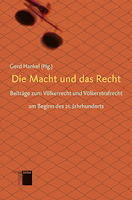 Gerd Hankel (Hamburg Foundation for the Advancement of Research and Culture) has published Die Macht und das Recht: Völkerrecht und Völkerstrafrecht am Beginn des 21. Jahrhunderts (Hamburger Edition 2008) [Power and Justice: International Law and International Criminal Law at the Beginning of the Twenty-First Century]. Here's the abstract:
Gerd Hankel (Hamburg Foundation for the Advancement of Research and Culture) has published Die Macht und das Recht: Völkerrecht und Völkerstrafrecht am Beginn des 21. Jahrhunderts (Hamburger Edition 2008) [Power and Justice: International Law and International Criminal Law at the Beginning of the Twenty-First Century]. Here's the abstract:Im Mai 1993 setzte der UN-Sicherheitsrat den Internationalen Strafgerichtshof für das ehemalige Jugoslawien ein und im November 1994 folgte der für Ruanda zuständige. 1998 begannen in Rom die Verhandlungen über ein Statut für einen Strafgerichtshof, dessen Aufgabe in der weltweiten Ahndung schwerster Verbrechen bestehen sollte. Vier Jahre später, im Juli 2002, trat es in Kraft und begründete den Internationalen Strafgerichtshof mit Sitz in Den Haag.
Die Hoffnungen, ja die Euphorie, welche die Entwicklung der internationalen Strafgerichtsbarkeit begleitet hatte und die ihre Kraft aus der Idee einer gewaltärmeren Welt bezog, war zu diesem Zeitpunkt jedoch bereits einer gewissen Ernüchterung gewichen. Die Anschläge vom 11. September 2001 und die fortdauernde terroristische Bedrohung ließen die schon vorher nur begrenzte Neigung der USA, sich multilateral zu binden und entsprechend zu agieren, deutlich zutage treten. Statt die Option eines gemeinsamen Vorgehens zu wählen, setzten sie vor allem auf militärische Stärke, mit fataler Signalwirkung für andere Mächte.
Heute ist unübersehbar, dass die Welt nicht sicherer geworden ist. Die militärische Antwort auf den Terror zeitigte keinen Erfolg. Der staatlich geführte Krieg, nach gegenwärtigem Völkerrechtsverständnis Ultima Ratio zur Abwehr von Angriffen auf die internationale Sicherheit und Ordnung, erweist sich zunehmend als untaugliches Mittel im Kampf gegen einen Feind, der mit dem herkömmlichen Feind im Sinne des Kriegsvölkerrechts so gut wie nichts mehr gemein hat.
Die Situation scheint verfahren. Die militärische Gewalt ist machtlos und führt zur Erosion zivilisatorischer Werte, das Völkerstrafrecht ist noch zu schwach und sieht sich zudem einflussreichen Gegnern gegenüber. Einfache Lösungen gibt es nicht. Aber es gibt die Möglichkeit – und die Autorinnen und Autoren dieses Bandes zeigen sie auf –, ausgehend von neueren Entwicklungslinien im Völkerrecht und Völkerstrafrecht den aktuellen Problemstand darzustellen und, darauf aufbauend, in stärkerem Maße konsensuelle und friedliche Perspektiven weiterzudenken.
In May 1993, the UN Security Council established the International Criminal Tribunal for the former Yugoslavia, followed in November 1994 by the International Criminal Tribunal for Rwanda. Negotiations on a statute for a permanent international criminal court responsible for prosecuting worldwide the most serious crimes of international concern began in Rom in 1998. Four years later, in July 2002, the statute establishing the International Criminal Court (ICC) based in The Hague entered into force.
By the time the ICC took up its work, however, the hopes, indeed euphoria, which accompanied the process leading up to the institutionalization of courts with international jurisdiction and which drew on the idea of a less violent world, had already given way to a certain degree of disenchantment. In the wake of the events of 11 September 2001 and the ongoing threat of terrorist attacks, the already limited willingness of the United States to enter into multilateral agreements and adjust its political activities accordingly became considerably more pronounced. Rather than prioritizing cooperative strategies in responding to terrorism, the government of the USA elected to rely on the country’s military strength and thus sent out an inauspicious signal to other powers.
Today, it is obvious that the world has not become a safer place. The strategy of responding to terror with military means has failed. Increasingly, wars waged by states — according to current understandings of international law, the ultima ratio for confronting threats to international security and order — have proved to be inadequate as a means of combating adversaries who have little in common with the classic concept of the enemy that underlies the international laws and customs of war.
The situation seems as convoluted as it is challenging: military force is ineffective and leads to the erosion of civil values; international criminal law is, so far, too weak and must deal with influential opponents. There are no easy solutions to the dilemma of legal responses to these kinds of crimes. But a feasible option — and the authors in this collection have seized this opportunity — is to carefully assess the current situation and issues on the backdrop of more recent developments in international law and employ this evaluation for conceptualizing more consensual, peaceful alternatives to today’s practices.





